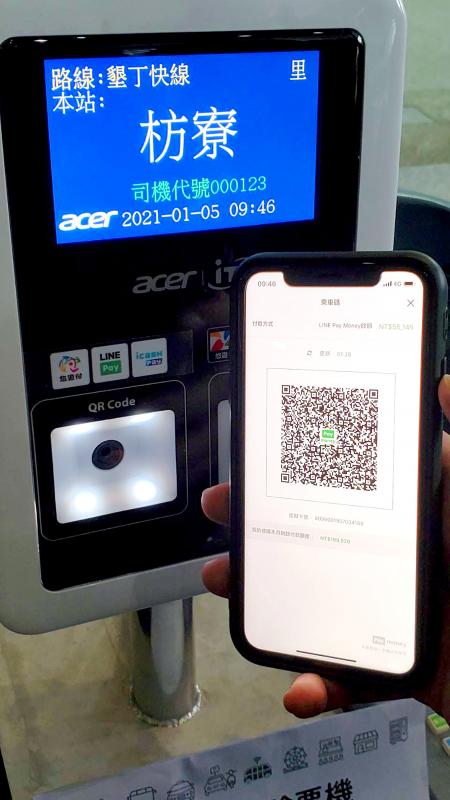The Directorate-General of Highways (DGH) yesterday began a six-month trial of allowing passengers to pay using mobile systems on five bus routes.
The highway authority said the routes are the Taipei-Keelung express bus service (No. 2088 and No. 1800) operated by Metropolitan Transport Corp and Kuo-Kuang Motor Transportation Co, the Kenting express bus service (No. 9189) operated by Kaohsiung Bus Co and Pingtung Bus Co and Kuo-Kuang Motor Transportation Co, and Taichung’s Guguan (谷關) bus service (No. 865) and Lishan (梨山) bus service (No. 865) operated by Fengyuan Bus Transportation Co.
In addition to coins or electronic cards, people can pay using Line Pay, EasyCard Corp’s Easy Wallet or iCash Pay of Uni-President Enterprises Corp, which owns the 7-Eleven convenience store chain.

Photo courtesy of the iPass Card
To pay via mobile payment, the passenger opens a QR code in their electronic wallet and places it close to the sensor on the bus’ card reader. A beep signals that the transaction is complete.
Public bus services across the nation are accessed about 12 billion times per year and generate more than NT$33 billion (US$1.16 billion) annually, Minister of Transportation and Communications Lin Chia-lung (林佳龍) told a launch ceremony.
“What is most valuable is the amount of big data collected through the bus service,” Lin said. “Analyzing data allows the bus operators to identify patterns in rider behavior, which allows them to improve their services and accurately market their services to target users.”

Photo courtesy of Wuling Farm
“The operators could develop value-added services by working with other service operators. It could potentially turn into a huge industry,” he added.
The incorporation of mobile payments into public transport is key for the nation’s development of a smart transportation system, which needs to know the flow of passengers, traffic, cash and data, he said.
Lin voiced his confidence in the trial’s success, saying that the test run would allow passengers, bus operators and manufacturers of card readers to help improve the service.
Card readers on the more than 15,000 buses across the nation are to be upgraded or replaced by 2025, Lin said.
Bus operators installing new machines on their fleets would receive a subsidy of NT$20,000 per machine, while upgrades would bring NT$5,000 per machine, he added.
If the trial proves successful, the number of bus routes accepting mobile payments would be expanded, DGH Director-General Hsu Cheng-chang (許鉦漳) said, adding that other mobile payment companies would be encouraged to participate.
To encourage people to switch to mobile payments, the bus operators and mobile payment companies participating in the trial are offering promotions, from a 50 percent discount on fares to points that accumulate to pay for up to 20 percent of a fare.
In other news, visitors to the Wuling Farm’s Cherry Blossom Season, which is open from Feb. 12 to March 1, are encouraged to take a public bus for a discount on admission, the highway authority said.
Starting today, independent travelers departing from Taipei or Yilan for a one-day tour at the farm can buy their bus tickets at the bus stations of Kuo-Kuang Motor Transportation, or at 7-Eleven, FamilyMart and Hi-Life convenience stores, it added.

Starlux Airlines, Taiwan’s newest international carrier, has announced it would apply to join the Oneworld global airline alliance before the end of next year. In an investor conference on Monday, Starlux Airlines chief executive officer Glenn Chai (翟健華) said joining the alliance would help it access Taiwan. Chai said that if accepted, Starlux would work with other airlines in the alliance on flight schedules, passenger transits and frequent flyer programs. The Oneworld alliance has 13 members, including American Airlines, British Airways, Cathay Pacific and Qantas, and serves more than 900 destinations in 170 territories. Joining Oneworld would also help boost

A new tropical storm formed late yesterday near Guam and is to approach closest to Taiwan on Thursday, the Central Weather Administration (CWA) said. Tropical Storm Pulasan became the 14th named storm of the year at 9:25pm yesterday, the agency said. As of 8am today, it was near Guam traveling northwest at 21kph, it said. The storm’s structure is relatively loose and conditions for strengthening are limited, WeatherRisk analyst Wu Sheng-yu (吳聖宇) said on Facebook. Its path is likely to be similar to Typhoon Bebinca, which passed north of Taiwan over Japan’s Ryukyu Islands and made landfall in Shanghai this morning, he said. However, it

Taiwan's Gold Apollo Co (金阿波羅通信) said today that the pagers used in detonations in Lebanon the day before were not made by it, but by a company called BAC which has a license to use its brand. At least nine people were killed and nearly 3,000 wounded when pagers used by Hezbollah members detonated simultaneously across Lebanon yesterday. Images of destroyed pagers analyzed by Reuters showed a format and stickers on the back that were consistent with pagers made by Gold Apollo. A senior Lebanese security source told Reuters that Hezbollah had ordered 5,000 pagers from Taiwan-based Gold Apollo. "The product was not

COLD FACTS: ‘Snow skin’ mooncakes, made with a glutinous rice skin and kept at a low temperature, have relatively few calories compared with other mooncakes Traditional mooncakes are a typical treat for many Taiwanese in the lead-up to the Mid-Autumn Festival, but a Taipei-based dietitian has urged people not to eat more than one per day and not to have them every day due to their high fat and calorie content. As mooncakes contain a lot of oil and sugar, they can have negative health effects on older people and those with diabetes, said Lai Yu-han (賴俞含), a dietitian at Taipei Hospital of the Ministry of Health and Welfare. “The maximum you can have is one mooncake a day, and do not eat them every day,” Lai